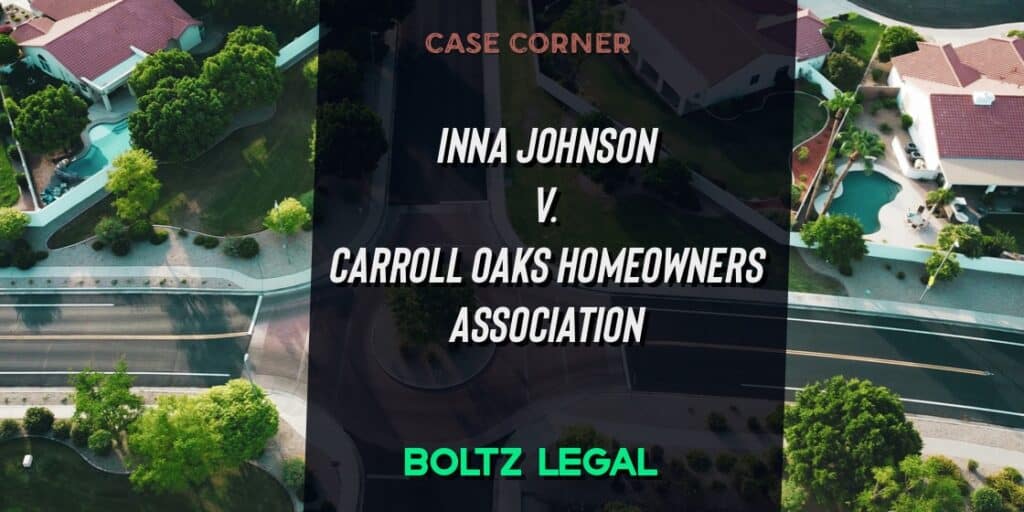Second District Court of Appeal, State of Florida
Case No. 2D2024-0631
Opinion Filed: April 23, 2025
Judges: Northcutt, Kelly, and Silberman, JJ.
Legal Area: Real Property – Towing – Homeowners Associations – Attorney’s Fees – Statutory Interpretation
The Second District Court of Appeal reversed a trial court’s decision awarding attorneys’ fees to a homeowners association after a towing dispute, holding that the underlying litigation was based on statutory obligations rather than contractual enforcement. The ruling clarifies the limits of attorney fee provisions within community declarations when the issue at hand involves statutory compliance rather than contractual breaches.
Background: A Parking Sticker, a Tow Truck, and a Legal Dispute
The case arose after Inna Johnson moved into her new unit within the Carroll Oaks residential community. Each unit in the community had a designated parking space, and residents were required to use a specific parking sticker issued by the association. However, when Johnson parked in her assigned space shortly after moving in, she used a guest hang tag because she had not yet received a resident sticker.
Carroll Oaks responded by having Johnson’s vehicle towed—despite it being parked in her designated space. Johnson filed suit, claiming the association violated Florida Statute § 715.07(2)(a)(5), which requires a property owner to post clear notice before towing a vehicle unless the vehicle’s owner had been personally notified that the vehicle was parked in an unauthorized location.
Trial Court Ruling: Summary Judgment and a Fee Award
Carroll Oaks successfully defended the suit by obtaining summary judgment. The trial court ruled that Johnson had received sufficient personal notice by virtue of being provided a package of the community’s governing documents prior to closing on the home. Among those documents was a summary and a single-page set of parking rules that briefly mentioned towing.
The association then moved for attorneys’ fees, relying on a fee provision in its recorded Declaration of Easements. The provision allowed the association to recover reasonable attorneys’ fees when it prevailed in enforcing the declaration’s restrictions.
The trial court agreed with the association and granted its motion, finding that the litigation involved the parties’ contractual relationship and thus triggered the declaration’s fee provision. Johnson appealed.
Appellate Court Analysis: Fees Must Align With Contract Enforcement
On appeal, the Second District Court of Appeal reversed the fee award. The court emphasized that merely referencing a contract between the parties—here, the declaration governing the homeowners association—is not enough to justify attorneys’ fees. Instead, the litigation must directly involve the enforcement of that contract.
In this case, Johnson’s claim was grounded not in a breach of the association’s internal rules but in a violation of a Florida statute that governs towing. Carroll Oaks’ successful defense—that Johnson had been given sufficient personal notice—was based entirely on a statutory exception. The appellate court made clear that proving compliance with a statutory requirement is not the same as enforcing a contractual term.
Distinguishing Prior Cases: Careers USA and Caufield
The trial court had relied on Careers USA, Inc. v. Sanctuary of Boca, Inc. and Caufield v. Cantele, both of which involved contracts with attorney fee provisions. In Careers USA, a declaratory judgment suit over lease obligations was deemed a proper trigger for a lease’s attorney fee clause. In Caufield, even a tort claim for misrepresentation “arising out of” a contract was enough to trigger a fees clause.
However, the appellate court noted that these cases involved direct disputes over the meaning, performance, or breach of a contract. In contrast, Johnson’s case did not arise from a contractual dispute—it was about whether the association had satisfied a specific requirement in Florida law prior to towing her car.
HOA Declarations and Strict Construction
In a special concurrence, Judge Silberman emphasized the importance of strictly construing attorney fee provisions in association declarations. The Carroll Oaks declaration did not contain broad language such as “arising out of” or “relating to” that might cover statutory claims tangentially involving community rules. Instead, the declaration’s fee provision only applied to proceedings enforcing the declaration or any supplemental document.
Here, the only towing-related documents Johnson received were a summary of regulations and a one-page parking agreement—neither of which clearly amended the declaration or independently included an attorney’s fee clause.
Key Legal Takeaways: When Fee Provisions Apply (and When They Don’t)
- Statutory claims do not automatically trigger fee awards
Attorneys’ fees under a community declaration cannot be awarded simply because the dispute involves parties in a contractual relationship. The claim must enforce the contract itself. - Summary documents are not binding declarations
Community handouts and informal summaries do not carry the same legal weight as formally recorded declarations or amendments. Fee awards must originate from language in enforceable documents. - Courts will strictly construe fee provisions
Florida courts have consistently required strict interpretation of attorney’s fee provisions in property and contract law. Vague or overly broad interpretations will not stand. - Statutory defenses do not constitute enforcement of rules
If a homeowners association defends itself by showing it complied with a statute (rather than enforcing a rule), the basis for awarding fees under a declaration evaporates.
Final Judgment
The Second District Court of Appeal reversed the trial court’s attorney fee award and clarified that Carroll Oaks was not entitled to recover fees under its declaration. The ruling reaffirms the principle that attorneys’ fee provisions must be rooted in actual enforcement of a contract—not merely incidental to it.
Implications for Florida Homeowners and Associations
This case serves as an important reminder for Florida homeowners and HOAs alike: not all disputes fall within the four corners of a declaration. When litigation arises from statutory obligations rather than association rules, even a prevailing party may walk away without recovering legal costs.
For homeowners, it’s essential to understand what notice—statutory or personal—is legally sufficient before towing can occur. For associations, it’s critical to ensure their enforcement actions are grounded in proper procedure and that fee requests are firmly rooted in enforceable provisions.
Today’s Insight
“Laws are spider webs through which the big flies pass and the little ones get caught.”
— Honoré de Balzac
Even when a declaration seems comprehensive, it cannot be stretched to cover every kind of dispute. Courts will hold associations—and their attorneys—to the exact language of their documents.

